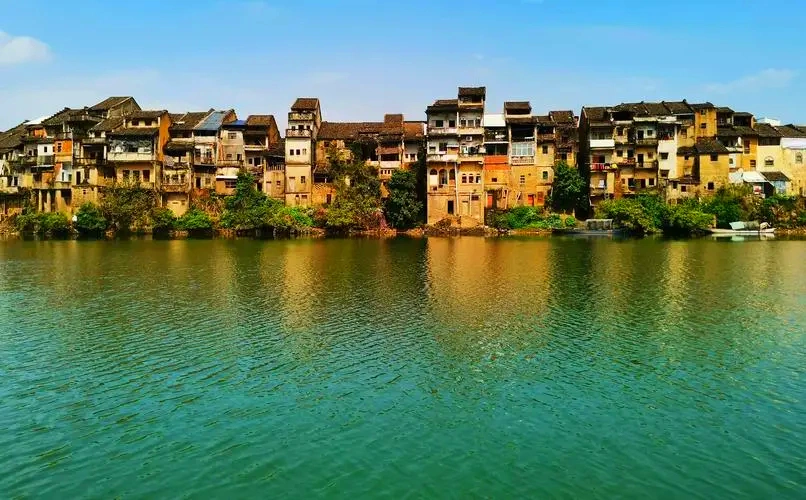
Songkou Ancient Town in Meizhou
Songkou Town (松口镇), located in Meizhou (梅州), Guangdong Province (广东省), is a significant area for understanding Hakka culture and history. Nestled at the convergence of Guangdong, Fujian, and Jiangxi provinces, Songkou serves as a pivotal starting point for Hakka people migrating overseas. This ancient town, with over 1,200 years of history, showcases rich cultural heritage, highlighted by its designation as the only “China (Meizhou) Immigration Memorial Square” in mainland China.
As a historical center, Songkou has been recognized for its contributions to overseas migration, earning accolades such as “Cultural Town,” “Hometown of Mountain Songs,” and “Hometown of Overseas Chinese.” The town’s economy is thriving, with notable achievements in agriculture and industry.
Historical Background
Songkou’s establishment predates Meizhou and is one of the four ancient towns in Lingnan. The town’s history dates back to the Western Jin Dynasty (西晋), originally known as Dongsha Village (东畲寨), before becoming Meikou and finally, Songkou in 945 AD during the Southern Han (南汉) Dynasty.
From the Song Dynasty (宋代) onwards, various Hakka clans migrated from Fujian and Jiangxi to Songkou, turning it into a commercial hub. By the late Qing Dynasty and early Republic of China, Songkou emerged as a crucial station for Hakka emigrants heading abroad and was recognized as the starting point of the “Maritime Silk Road” for overseas Chinese. In 1994, Songbei Township (松北乡) merged with Songkou Town.
Administrative Division
As of June 2020, Songkou Town comprises 41 administrative villages and five communities, serving a registered population of over 64,000.
Geographical Environment
Songkou is strategically situated at the intersection of Guangdong, Fujian, and Jiangxi provinces, approximately 48.1 kilometers from the Meixian (梅县) government. It covers an area of 328.4 square kilometers, bordered by Dapu County (大埔县) and neighboring towns.
Cultural Significance
Name Origin
The name “Songkou” is believed to derive from two theories: one suggests it comes from the Songyuan River (松源河) flowing into the Meijiang River (梅江), while another posits that it is a combination of Songbai Market (松柏墟) and Xikou Market (溪口墟).
Hakka Community
Songkou is a central hub for Hakka culture, where many Hakka people first settled during their migration to Southeast Asia. The town played a critical role in facilitating overseas migration and trade, particularly during the late Qing Dynasty and the Republic era.
Trading Hub
Due to its geographical location, Songkou has historically thrived as a commercial center, connecting various regions for trade. During its peak, the town boasted over 1,000 shops and a bustling port, evidencing its vibrant economy and transport links.
Overseas Chinese Culture
Starting from the Song Dynasty, particularly during the late Qing and early Republic periods, Songkou became a crucial stop for Hakka people emigrating abroad. The local populace engaged in maritime trade without needing to pass through the provincial capital, which contributed to the saying “Songkou does not recognize the state.”
Today, over 80,000 overseas Chinese from Songkou reside in various countries, significantly outnumbering the local population. Notable figures like Li Jiuxiang (李九香) and Zhang Rongxuan (张榕轩) represent successful Hakka families who have influenced both their home communities and the countries in which they settled.
Scenic Attractions
Songkou, recognized as one of the four ancient towns of Lingnan, is home to numerous traditional villages like Tongpa Village (铜琶村), Dahuang Village (大黄村), and Nansha Village (南下村). The town features the unique “Eight Scenic Spots of Songkou” (松口八景), which include scenic views such as Ganyu Naliang (甘露纳凉) and Yanquai Reflection (元魁倒影).
Notable historical sites include:
- Shide Hall (世德堂): A significant architectural relic reflecting Hakka culture.
- Yuan Kui Pagoda (元魁塔): A well-preserved ancient structure over 400 years old.
- Immigration Memorial Square (中国(梅州)移民纪念广场): The only memorial of its kind in mainland China.
The town’s architecture showcases a blend of Hakka culture and local traditions, making it a rich site for historical exploration.
Local Cuisine
Songkou offers a variety of Hakka delicacies, including:
- Songkou Qilu Pie (松口企炉饼)
- Songkou Fried Meatballs (松口炸肉丸)
- Fish Noodles (鱼散粉)
- Sweet Lamb (甜羊)
- Lamb Vinegar Soup (羊醋汤)
Honors and Recognitions
Songkou Town has received numerous honors, such as:
- UNESCO recognition as a “China Immigration Memorial Site” in 2012.
- Rated as a “National Key Town” and “Historical Cultural Town” in 2014.
- Acknowledged as one of “Guangdong’s Top Ten Ancient Villages” in 2018.












